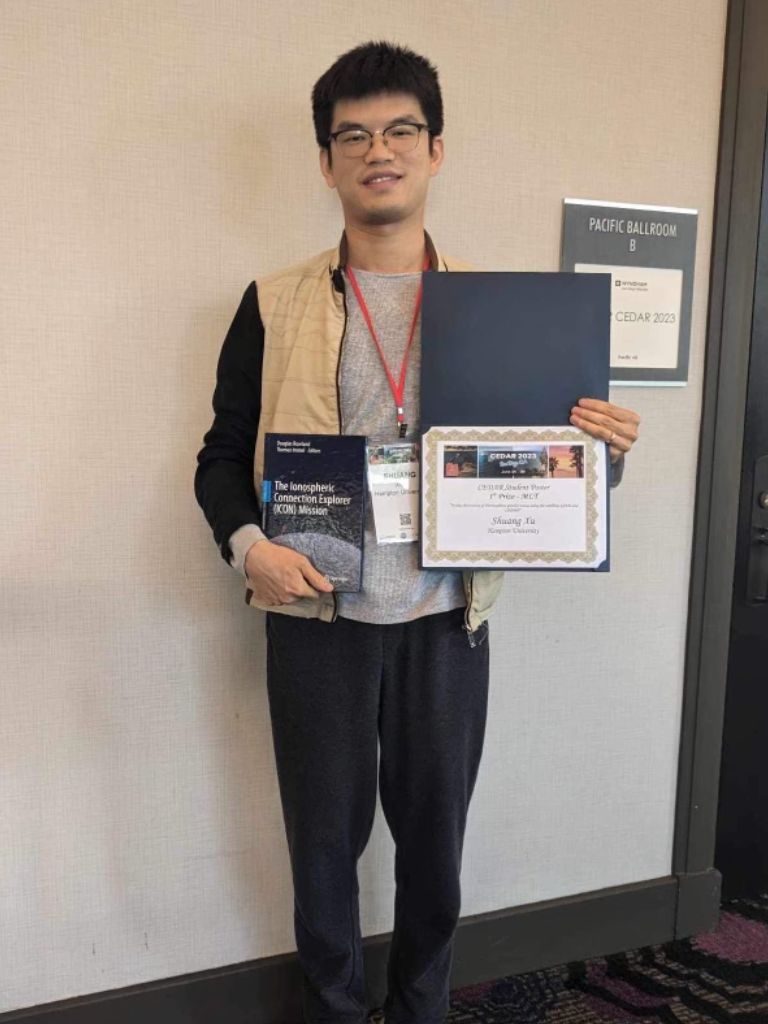Announcement of Opportunity for potential Graduate Students
Interested in applying?
The Department of Atmospheric and Planetary Sciences (APS) provides a program in graduate education leading to the M.S. and Ph.D. degrees in either Atmospheric Science or Planetary Science. Students from a variety of academic disciplines are welcome, and the curriculum maintains flexibility to match the interests of individual students. Academics, research, and service to the scientific community, the university, and the public are integral elements of the mission of the department. A high ratio of faculty to students ensures that students at all levels receive ample time for mentoring, training, and guidance.
The principal objective of the graduate program is to prepare students for successful careers and leadership roles in private and government research laboratories, and in academia. Essential support is provided by the department’s research center, the Center for Atmospheric Sciences (CAS). Intellectual vitality fostered by active research is integral to Hampton University’s institutional vision, and CAS is a key resource for students and faculty. The center hosts research faculty, support personnel, and infrastructure required to maintain rigorous programs of sponsored research.
Research and education partners include NASA, NOAA, the NSF, the EPA, and the DOD, and approximately 20 research universities, laboratories, and other scientific organizations in the U.S. and abroad. Hampton University is a member university of the National Institute of Aerospace; a consortium of universities offering graduate education in aerospace-related sciences and engineering. The NIA is headquartered in Hampton, and students can receive credit for graduate-level courses offered by the partner schools on-site at the NIA, or remotely via teleconferencing. Proximity to NASA’s Langley Research Center also provides for convenient access to the many research opportunities offered there. In addition, Hampton University is a member institution of the University Corporation for Atmospheric Research.
M.S. Program (30 Credits)
The thesis-based Master of Science (M.S.) degree program provides a graduate-level curriculum for students seeking the M.S. degree as a terminal degree, or as an intermediate step in pursuit of the Ph.D. Required coursework includes a minimum of 30 total credit hours; to include 18 hours of required atmospheric science or planetary science courses, 9 hours of approved electives, and 3 hours of thesis research. The overall grade point in this coursework must be 3.0, or higher. For completion of the degree, students are required to complete a research project and effectively communicate the results in a written thesis, to be defended before a committee of at least three members approved by the department chairperson. Students must also meet all admission and completion requirements of the Graduate College and complete a minimum of one semester as a supervised teaching assistant.
M.S. Curriculum:
- Atmospheric Physics
- Atmospheric Radiative Transfer
- Introduction to Structure and Dynamics (AST)/Principles of Planetary Science (PST)
- Geophysical Fluid Dynamics
- Atmospheric Chemistry (AST)/Space Weather (PST)
- Research
- Thesis
- Approved Electives
Ph.D. Program (74 Credits)
The Dissertation-based Ph.D. program in atmospheric and planetary sciences at Hampton University provides advanced coursework and research experience beyond the M.S. level. The Ph.D. degree is granted to those students who demonstrate a broad level of knowledge required by the M.S. degree, a high level of expertise in a specific area of the discipline, and the ability to perform original independent research that contributes to the discipline.
The Ph.D. degree requires a minimum of 74 credit hours of course work beyond the baccalaureate level. A student must complete 13 credit hours of core atmospheric and planetary science courses, 10 additional hours of required APS 600 and 700 level coursework, 15 hours of approved graduate level electives, and a minimum of 36 hours of dissertation research. A grade of B, or better, is required for all core courses. Only six hours of dissertation research will be given a letter grade; all other hours will be graded as Satisfactory/Unsatisfactory. Students must also pass the doctoral qualifying exam.
Subsequent to admission to candidacy to the doctoral program, the student establishes a dissertation topic in consultation with a faculty research advisor. The topic must be approved by the student’s Ph.D. committee. That committee is formed with approval of the Graduate College. The committee must have a minimum of four members, of whom at least three are Hampton University faculty, and at least one member must be from an area or department not directly associated with the student’s program track (Atmospheric or Planetary). The written dissertation must be successfully defended before the Ph.D. committee, and submitted for publication to a peer-reviewed journal of the field before a degree is awarded.
Additionally, students must meet all admission and completion requirements of the Graduate College, and complete a minimum of two semesters as a supervised teaching assistant.
Ph.D. Curriculum:
- Atmospheric Physics
- Atmospheric Radiative Transfer
- Geophysical Fluid Dynamics
- Atmospheric Measurements
- Writing and Presenting
- Seminar
- Introduction to Structure and Dynamics (AST)/Principles of Planetary Science (PST)
- Atmospheric Chemistry (AST)/Space Weather (PST)
- Research
- Final Oral Exam
- Approved Electives
APS Admission Requirements:
The program welcomes students from atmospheric science, planetary science, astronomy, chemistry, computer science, engineering, environmental sciences, mathematics, physics, and other areas.
- 3.0 GPA or equivalent
- 2-3 Semesters of Calculus
- Differential Equations
- 2 Semesters Calculus-based physics
- TOEFFL – for international students
- 3 letters of recommendation
- Personal Statement
- Linear Algebra recommended.
- Knowledge of some computer programming language.

